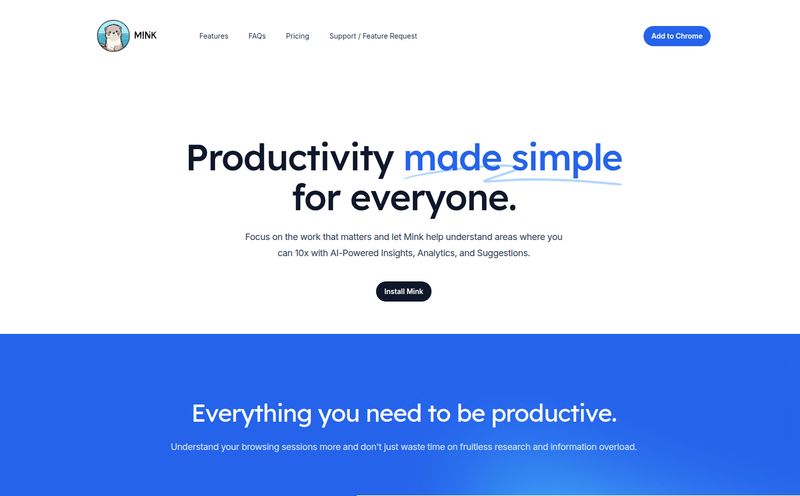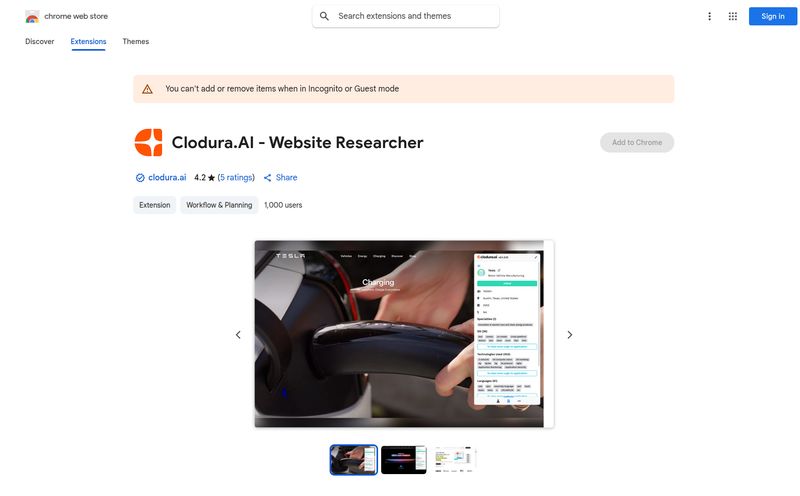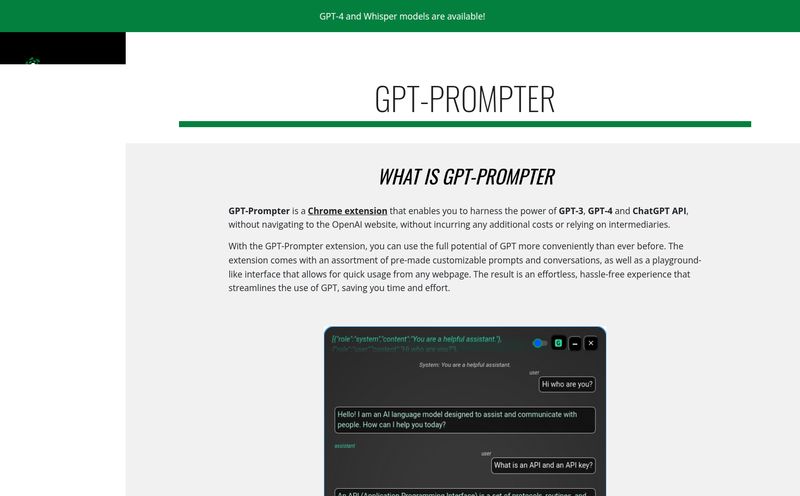We've all been there. It's 2 AM, you're staring at a stubborn bug, and the only thing keeping you company is the lukewarm dregs of your coffee. The world of development is exhilarating, but man, can it be a grind. The boilerplate, the endless documentation, the unit tests... it's the stuff that makes you wish you had a clone. Or at least, a really, really smart assistant.
For a while now, tools like GitHub Copilot have been that assistant for many. They're great. But I've always felt like there was room for something... more. Something that didn't just autocomplete my code but helped me conceptualize, build, and deploy the whole shebang. So when I stumbled across CodeAI, with its slick landing page and bold claims, my curiosity was definitely piqued. Another AI tool promising to revolutionize my workflow? Okay, I'll bite.
So, What is CodeAI, Really?
At first glance, you might lump CodeAI in with the dozen other AI code generators out there. But that's like calling a smartphone just a phone. CodeAI bills itself as an AI-Powered Development Platform. It’s not just about writing a single function or debugging a pesky line of CSS. It’s designed to be a partner through the entire development lifecycle. Think of it less as a backseat driver who occasionally points out a turn and more like a seasoned co-pilot who's helping you chart the course, check the instruments, and even take the stick for a bit.
It's built to help you generate entire full-stack applications from a simple prompt, optimize your existing code, write documentation (thank god), and even create the necessary tests. It’s an ambitious goal, and frankly, one I was pretty skeptical about at first.
My First Impressions: A Quick Walkthrough
The first thing you see on their site is a clean, dark-mode interface that just feels… developer-centric. It doesn't waste your time with fluff. The main call to action is right there: "Create Your First Project." You literally just type a description of what you want to build—like "a stunning dashboard for tracking user analytics"—pick your framework of choice (they prominently feature Next.js and React), and hit go.

Visit CodeAI
This simplicity is deceptive. Behind that single text box is a powerful engine that aims to scaffold an entire project for you. No more `create-react-app` and then spending the next hour installing and configuring dependencies. The idea is to go from a thought to a functional codebase in minutes. For a guy who's spent countless hours setting up new projects, this felt like a breath of fresh air.
The Standout Features of CodeAI
Okay, let's get into the meat and potatoes. What does this thing actually do? I’ve been playing around with it, and a few things really jumped out at me.
From Zero to Full-Stack with AI
This is the headline feature, isn't it? The promise of generating a full-stack application. It’s not magic; you still need to know what you’re doing. But CodeAI can generate the foundational structure, connect the database, set up the API routes, and build out the frontend components. It's an incredible accelerator. It takes care of the tedious setup, letting you focus on the unique logic and features that make your app special. It's like an architect that hands you the blueprint and all the raw materials, perfectly organized.
More Than Just Code: Documentation and Testing
I will be the first to admit, I sometimes get lazy with documentation. It’s the last thing you want to do after you’ve finally finished a complex feature. CodeAI's ability to auto-generate documentation and unit tests is a game-changer for solo devs and small teams. It instills good habits by making them effortless. The AI scans your code and produces clear, concise explanations and tests to ensure everything works as expected. It’s not perfect, you'll still need to review and tweak it, but it gets you 90% of the way there.
Your Code, Your Privacy
Now this is a big one. In an era where we're sending everything to the cloud, the "local-first privacy" approach of CodeAI is a massive plus. Many developers (myself included) are a bit hesitant to feed their proprietary code into a third-party AI model. CodeAI addresses this head-on. It ensures your code remains secure and private, which is crucial for anyone working on sensitive projects or for a company with strict IP policies. It gives you peace of mind, which is priceless.
One-Click Deployment and Git Magic
Writing the code is only half the battle. Getting it live can be its own special kind of headache. The seamless integration with GitHub and one-click deployment through platforms like Vercel is just... smooth. It automates workflows, handles commit messages, and can even help you analyze deployment logs if something goes wrong. I remember the old days of manually FTPing files to a server and praying nothing broke. This is lightyears ahead of that.
The Good, The Bad, and The AI-Generated
No tool is perfect, right? After spending some time with CodeAI, here's my honest breakdown.
On the plus side, the comprehensive nature is its biggest strength. It’s an all-in-one environment that seriously speeds things up. The privacy-first model is a huge trust signal, and the deep GitHub integration is beautifully executed. The support for multiple AI models on the paid plans means you're not locked into a single ecosystem, which is always smart.
However, there are some trade-offs. The free plan, while a great way to test the waters, is quite limited. You get a small number of AI generation calls and token usage, and you're restricted to the GPT-3.5 model. To really unlock its power, you'll need to jump on a paid plan. And this should go without saying, but you can't just blindly trust the AI. The generated code is a starting point, a very advanced one, but it still needs a human eye to review, refine, and take responsibility for it.
How Much Does CodeAI Cost?
Pricing is always a key factor. CodeAI uses a tiered model, which seems to cater to everyone from hobbyists to enterprise teams. Here’s a quick rundown:
- Code Explorer (Free): This is your entry point. You get 2 public projects, limited access to the Pro studio, and 60 AI calls per month using the GPT-3.5 model. It’s perfect for trying it out on a personal blog or a small tool.
- Code Innovator ($12/month): This seems like the sweet spot for solo developers and freelancers. You get unlimited projects (private and public!), full access to all AI models, more AI calls (366/month), a higher token limit, and AI-generated commit messages.
- Code Master ($45/month): Aimed at small teams. This tier adds collaboration features, way more AI calls (1,220/month) and tokens, and priority support.
- Code Guru ($350/month): This is the full enterprise-level package. We're talking white-labeling, unlimited everything, a dedicated account manager, custom onboarding, and enterprise-grade security.
The jump in price is significant between tiers, so you really have to assess your needs. The Innovator plan feels very reasonably priced for the value it provides to an individual. You can check out the full details on their pricing page.
Who Is CodeAI Actually For?
So, who should drop what they're doing and try CodeAI? If you're a solo developer or a freelancer, I think the Code Innovator plan could be a massive productivity booster. It automates the boring stuff and lets you deliver projects faster.
For small to mid-sized teams, the Code Master plan, with its collaboration features, could streamline your workflow and ensure consistency across your codebase. For large enterprises, the Guru plan offers the security, support, and scale you'd need. If you're just a student or a hobbyist, the free plan is more than enough to get your feet wet and build some cool public projects.
Frequently Asked Questions About CodeAI
- Is CodeAI free to use?
- Yes, there is a free "Code Explorer" plan. It's limited in features, projects, and AI usage but is a great way to start.
- How does CodeAI ensure my code is private?
- CodeAI promotes a "local-first privacy" approach, meaning your code is processed securely and isn't used to train public models without your consent, offering more security than some cloud-only alternatives.
- What AI models does CodeAI support?
- The free plan is limited to GPT-3.5. However, paid plans offer access to multiple advanced models, giving you more flexibility and power.
- Can I use CodeAI with my existing GitHub projects?
- Absolutely. The platform features deep GitHub integration, allowing you to connect to your existing repositories and automate workflows.
- How is CodeAI different from GitHub Copilot?
- Think of it this way: Copilot is primarily an in-editor autocomplete tool. CodeAI is a broader development platform that helps with project scaffolding, full-stack generation, documentation, testing, and deployment, in addition to code generation.
- Is the AI-generated code always perfect?
- No, and no AI tool's is. The generated code is a powerful starting point and should always be reviewed, tested, and understood by a human developer before being pushed to production.
My Final Thoughts: Is CodeAI Worth It?
After digging in, I have to say I'm impressed. CodeAI isn't just another flashy AI gimmick. It’s a well-thought-out tool that addresses real-world developer pain points. It won't replace developers—it'll make them better, faster, and more focused on the creative aspects of their job.
Is it for everyone? Maybe not. If you're a die-hard vim user who loves manually configuring every dotfile, this might feel like too much hand-holding. But for the vast majority of developers who want to build and ship cool things without getting bogged down in the repetitive muck, CodeAI is absolutely worth a look. It feels like a genuine step forward in what an AI coding partner can be.



